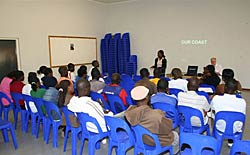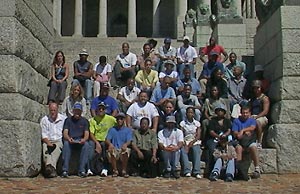Stakeholder Participation Course
The DLIST Stakeholder Participation Course is now available online on the DLIST portal!
 Public participation lies at the heart of any democratic society. People have the right to have input into processes and initiatives that affect their lives, and it is well known that meaningful public participation of interested and affected parties will increase not only ownership but also the chances of such processes and initiatives being successful. Yet common misconceptions of what is meant by “participation” continue to persist. Lack of proper participation cause many worthwhile initiatives, whether from the side of government or having other origins, to work less than optimally or even fail. Public participation lies at the heart of any democratic society. People have the right to have input into processes and initiatives that affect their lives, and it is well known that meaningful public participation of interested and affected parties will increase not only ownership but also the chances of such processes and initiatives being successful. Yet common misconceptions of what is meant by “participation” continue to persist. Lack of proper participation cause many worthwhile initiatives, whether from the side of government or having other origins, to work less than optimally or even fail.
The DLIST Benguela project has been involved in many activities and processes over the years, from policy processes to youth activities, film festivals to radio broadcasting... in our quest to build and share knowledge and information across all sectors we have always encountered one important aspect that no process will be successful without - people and communities, their views, needs and concerns. A stakeholder participation process allows groups of individuals to influence the outcome of plans, policies and projects. It is in recognising this vital role that DLIST has developed the stakeholder participation course.
The idea for this course originated out of a workshop held in Lesotho by the IW:Learn (a programme that promotes information sharing and learning among GEF projects). Out of it arose the concern that, although public participation is vital in any decision making process, there are not enough practitioners who are able to undertake such activity.
The aim of the course is two fold. Firstly, it aims to inform those who want to conduct stakeholder participation, how to do so effectively. Secondly, the course is aimed at informing the stakeholders how they can play a more active role in decision making processes. So in actual fact the course is useful to anyone who is interested in the general process of stakeholder participation.
The course is now available online. It is open to anyone. There are 5 modules, each consisting of notes, a powerpoint presentation and a case study. If you are interested in undertaking this course, please contact the DLIST Team (kashiefa@ecoafrica.co.za). All you need to do is provide us with just a few details in order to register... then you are set to go! There is a small course fee. The course facilitator will send you weekly emails to assist you with the modules and to answer queries. After the 5 weeks of sufficient interaction you will receive a DLIST certificate of completion of the Stakeholder Participation Course.
The first round of courses will start on 1st September 2008. To visit the course, see the link below. Send us an email admin@dlist-benguela.org for more details or if you wish to register!
http://www.dlist-benguela.org/Course_Information/Stakeholder_Participation_Course/
Environmental Engineering – Sustainable Development in Coastal Areas
The Department of Mechanical Engineering at the Cape Peninsula University of Technology (CPUT), in conjunction with DLIST are inviting applications from suitably qualified or experienced individuals to pursue a distance learning degree-level course in Environmental Engineering. The course will be offered from January 2009 until June 2009 and covers a number of topics within four core modules and two elective modules.
 The course aims to present the subject with a broad coverage, examining practice and development in a holistic way, so as to assist graduates to deal with environmental problems and offer solutions more meaningfully. Site visits are undertaken so as to give students first-hand exposure to environmental engineering issues and to ask questions from industry professionals. Course topics include coastal areas, management tools, energy, water, air quality, wastes. Information literacy is infused into the curriculum and assessed implicitly throughout the course. Introductory sessions on information literacy and electronic databases are done. Specific introductory skills in project management, environmental impact assessment (EIA), water and energy audits are covered. The course aims to present the subject with a broad coverage, examining practice and development in a holistic way, so as to assist graduates to deal with environmental problems and offer solutions more meaningfully. Site visits are undertaken so as to give students first-hand exposure to environmental engineering issues and to ask questions from industry professionals. Course topics include coastal areas, management tools, energy, water, air quality, wastes. Information literacy is infused into the curriculum and assessed implicitly throughout the course. Introductory sessions on information literacy and electronic databases are done. Specific introductory skills in project management, environmental impact assessment (EIA), water and energy audits are covered.
Applications close on 31 August 2008. To download the application form click here.
|